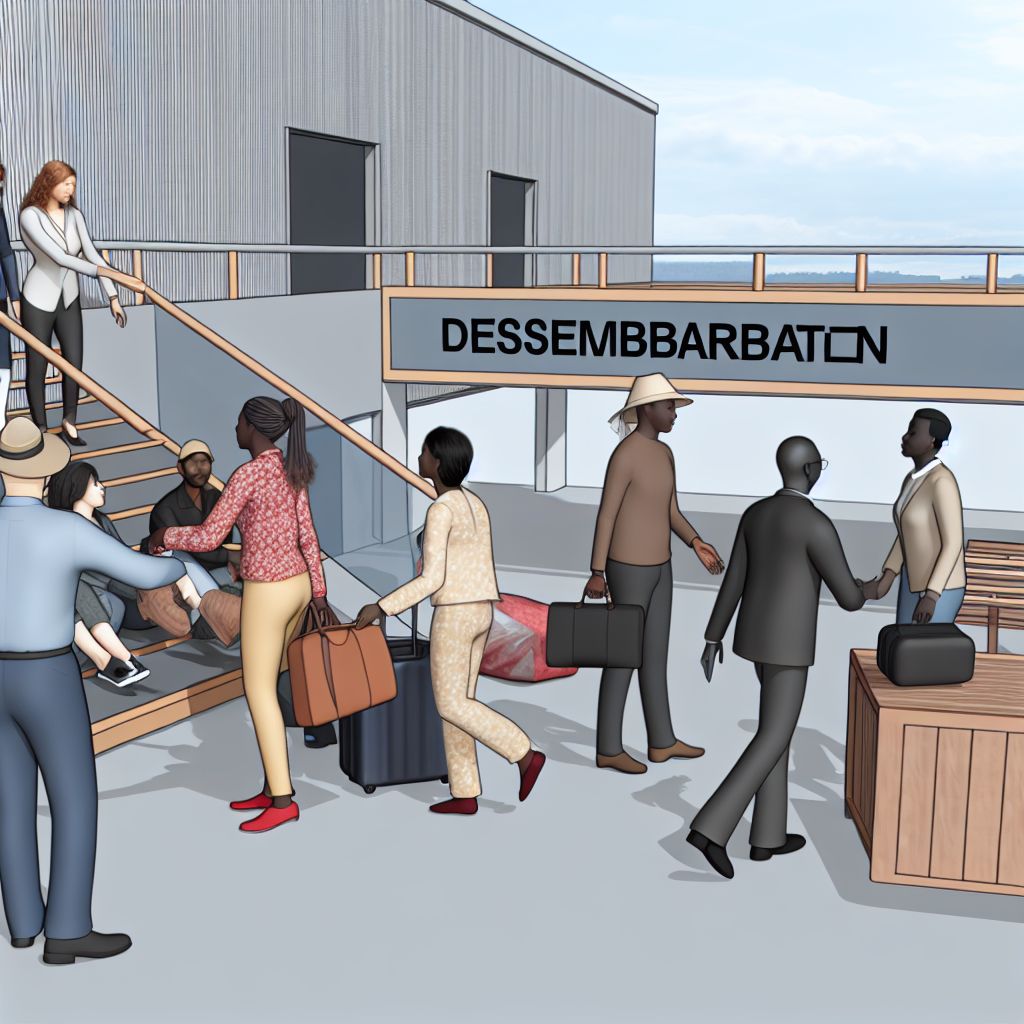Deutsch: Ausschiffung / Español: Desembarco / Português: Desembarque / Français: Débarquement / Italiano: Sbarco
In the travel context, disembarkation refers to the process of leaving a vehicle or vessel, such as a plane, ship, or train, at the end of a journey. It is the counterpart to embarkation, which involves boarding the vehicle or vessel at the beginning of a trip. Disembarkation is a critical phase in travel, involving procedures and protocols designed to ensure the safe, efficient, and orderly exit of passengers and crew from the transport mode.
Description

Disembarkation procedures can vary depending on the mode of transport and the destination's regulations. For air travel, it involves passengers leaving the aircraft and proceeding through the airport terminal to complete immigration, customs checks, and baggage claim. In the case of cruise ships or ferries, disembarkation includes leaving the vessel, passing through port facilities, and possibly undergoing health and security screenings. Efficient disembarkation processes are essential for minimizing wait times and facilitating smooth transitions to ground transportation or connecting flights.
Application Areas
- Air Travel: Passengers leave the aircraft and proceed through various airport procedures, including passport control and customs.
- Maritime Travel: Involves passengers leaving a ship, boat, or ferry and completing any necessary port formalities.
- Rail Travel: The process where passengers exit a train and navigate through the station to exit or transfer to other modes of transport.
Well-Known Examples
- Cruise Ship Disembarkation: Often involves specific time slots and procedures for different sections of the ship to prevent congestion in disembarkation areas and customs.
- Airport Arrival Procedures: Include steps such as immigration checks and baggage reclaim before passengers can exit the airport.
Treatment and Risks
Effective disembarkation processes are vital for maintaining safety, especially in emergencies or under health protocols to prevent the spread of diseases. Delays or inefficiencies in disembarkation can lead to passenger congestion, increased stress, and missed connections. Travelers are advised to follow crew instructions and be prepared with all necessary documentation to ensure a smooth disembarkation process.
Similar Terms
- Deboarding: Another term used interchangeably with disembarkation, particularly in the context of air travel.
- Landing: Specifically refers to an aircraft's arrival on the ground, after which disembarkation occurs.
Summary
Disembarkation is the process by which travelers exit a mode of transportation upon reaching their destination, marking the conclusion of a journey. It involves a series of steps designed to ensure passenger safety, comply with regulatory requirements, and facilitate a smooth transition to the next phase of travel, whether that be entering a new country, transferring to another mode of transportation, or returning home.
--
Related Articles to the term 'Disembarkation' | |
| 'Cargo' at top500.de | ■■■■■■■■■■ |
| Cargo is a term used to denote freight, goods or produce being transported generally for commercial gain, . . . Read More | |
| 'Terminal' at quality-database.eu | ■■■■■■■■■■ |
| Terminal in the context of quality management refers to a final point or stage in a process where outputs . . . Read More | |
| 'Dock' | ■■■■■■■■■ |
| A dock in the context of travel is a waterfront structure designed to receive vessels, allowing for the . . . Read More | |
| 'Check-In' | ■■■■■■■■■ |
| Check-In is the procedures for a Hotel Guest's arrival and registration. . . . Read More | |
| 'Traffic' | ■■■■■■■■ |
| In the travel context, "traffic" refers to the movement of vehicles and pedestrians on roads, streets, . . . Read More | |
| 'Eurostar' | ■■■■■■■■ |
| Eurostar in the travel context refers to a high-speed train Service that connects several major cities . . . Read More | |
| 'Two-door' | ■■■■■■■■ |
| Two-door: In the travel context, "two-door" typically refers to a type of vehicle configuration, most . . . Read More | |
| 'Windshield' | ■■■■■■■■ |
| Windshield: In the travel context, a windshield is a critical component of a vehicle, designed to protect . . . Read More | |
| 'Cruiseliner' | ■■■■■■■■ |
| Cruiseliner: In the travel context, a cruiseliner refers to a large passenger ship designed for leisure . . . Read More | |
| 'Surveillance' | ■■■■■■■■ |
| Surveillance in the travel context refers to the monitoring and observation of travellers and travel-related . . . Read More | |
